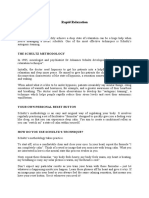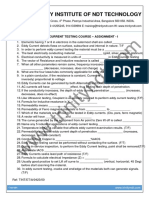5b1 Dunod FR Uk-1558701007240
5b1 Dunod FR Uk-1558701007240
Uploaded by
Safa SobhCopyright:
Available Formats
5b1 Dunod FR Uk-1558701007240
5b1 Dunod FR Uk-1558701007240
Uploaded by
Safa SobhOriginal Title
Copyright
Available Formats
Share this document
Did you find this document useful?
Is this content inappropriate?
Copyright:
Available Formats
5b1 Dunod FR Uk-1558701007240
5b1 Dunod FR Uk-1558701007240
Uploaded by
Safa SobhCopyright:
Available Formats
Breathing: The Secret to Feeling Good
Hello everyone!
Did you know that there is a simple but effective way to manage your stress more effectively?
It's actually something you do every day – breathing!
BREATHING IS THE SECRET TO FEELING GOOD
When you breathe in, you draw oxygen into your body. This oxygen is then taken in by your
red blood cells, which use it to nourish all the other cells in your body.
About 90% of all the energy your body produces is thanks to oxygen, as compared with just
10% for food and water.
As a result, the first thing you need to do to maintain your inner equilibrium is to be aware of
the importance of breathing.
THE DIAPHRAGM: YOUR BREATHING MUSCLE
When you breathe in, your lungs inflate with air. But how exactly does this work? It’s all
thanks to the diaphragm. This dome-shaped muscle pulls downwards as you breathe in, then
relaxes again when you breathe out. It is a little like pulling on a piece of elastic and then
letting it go so it springs back to shape. As for your stomach, it inflates when you breathe in
(an active movement), then deflates when you breathe out (a passive movement).
CHEST BREATHING OR STOMACH BREATHING?
We breathe automatically. When we are stressed, we stop breathing as deeply from our
stomachs. Our breaths become shallow, rising from our chest only, and our diaphragm might
even get stuck. Sometimes the opposite can happen, and our stomachs tighten on an in-breath
and relax on an out-breath.
The good news is that we can consciously control our breathing. We can positively activate
our nervous system by taking some easy steps to work on our breathing.
LENGTHEN YOUR BREATH TO CALM YOUR MIND
Give it a try! Breathe in deeper… Then breathe out for longer…
When you breathe in deeply, you activate the sympathetic part of the autonomic nervous
system which stimulates your body.
When you breathe out slowly and for as long as you can, you activate your nervous system’s
parasympathetic part, which calms you down.
This is why lengthening your exhalations helps you to quickly calm yourself down.
KEEPING YOUR HEART ON THE RIGHT BEAT
Research has shown that stress reduces our heart’s ability to adapt to what is going on around
us.
To make your heart more adaptable, you can practise cardiac coherence.
Try the following activity: for five minutes, rhythmically breathe in for five seconds, then out
again for another five. This will help to synchronise your heartbeat and breathing, which is the
aim of cardiac coherence. This ancient stress-management technique is both easy to do and
very effective.
Thank you for your attention and see you soon!
You might also like
- The Subtle Art of Not Giving a F*ck: A Counterintuitive Approach to Living a Good LifeFrom EverandThe Subtle Art of Not Giving a F*ck: A Counterintuitive Approach to Living a Good LifeRating: 4 out of 5 stars4/5 (5950)
- The Gifts of Imperfection: Let Go of Who You Think You're Supposed to Be and Embrace Who You AreFrom EverandThe Gifts of Imperfection: Let Go of Who You Think You're Supposed to Be and Embrace Who You AreRating: 4 out of 5 stars4/5 (1109)
- Never Split the Difference: Negotiating As If Your Life Depended On ItFrom EverandNever Split the Difference: Negotiating As If Your Life Depended On ItRating: 4.5 out of 5 stars4.5/5 (888)
- Hidden Figures: The American Dream and the Untold Story of the Black Women Mathematicians Who Helped Win the Space RaceFrom EverandHidden Figures: The American Dream and the Untold Story of the Black Women Mathematicians Who Helped Win the Space RaceRating: 4 out of 5 stars4/5 (927)
- Grit: The Power of Passion and PerseveranceFrom EverandGrit: The Power of Passion and PerseveranceRating: 4 out of 5 stars4/5 (619)
- Shoe Dog: A Memoir by the Creator of NikeFrom EverandShoe Dog: A Memoir by the Creator of NikeRating: 4.5 out of 5 stars4.5/5 (545)
- The Hard Thing About Hard Things: Building a Business When There Are No Easy AnswersFrom EverandThe Hard Thing About Hard Things: Building a Business When There Are No Easy AnswersRating: 4.5 out of 5 stars4.5/5 (354)
- Elon Musk: Tesla, SpaceX, and the Quest for a Fantastic FutureFrom EverandElon Musk: Tesla, SpaceX, and the Quest for a Fantastic FutureRating: 4.5 out of 5 stars4.5/5 (476)
- Her Body and Other Parties: StoriesFrom EverandHer Body and Other Parties: StoriesRating: 4 out of 5 stars4/5 (831)
- The Emperor of All Maladies: A Biography of CancerFrom EverandThe Emperor of All Maladies: A Biography of CancerRating: 4.5 out of 5 stars4.5/5 (274)
- The Little Book of Hygge: Danish Secrets to Happy LivingFrom EverandThe Little Book of Hygge: Danish Secrets to Happy LivingRating: 3.5 out of 5 stars3.5/5 (419)
- The World Is Flat 3.0: A Brief History of the Twenty-first CenturyFrom EverandThe World Is Flat 3.0: A Brief History of the Twenty-first CenturyRating: 3.5 out of 5 stars3.5/5 (2272)
- The Yellow House: A Memoir (2019 National Book Award Winner)From EverandThe Yellow House: A Memoir (2019 National Book Award Winner)Rating: 4 out of 5 stars4/5 (99)
- Devil in the Grove: Thurgood Marshall, the Groveland Boys, and the Dawn of a New AmericaFrom EverandDevil in the Grove: Thurgood Marshall, the Groveland Boys, and the Dawn of a New AmericaRating: 4.5 out of 5 stars4.5/5 (270)
- The Sympathizer: A Novel (Pulitzer Prize for Fiction)From EverandThe Sympathizer: A Novel (Pulitzer Prize for Fiction)Rating: 4.5 out of 5 stars4.5/5 (124)
- Team of Rivals: The Political Genius of Abraham LincolnFrom EverandTeam of Rivals: The Political Genius of Abraham LincolnRating: 4.5 out of 5 stars4.5/5 (235)
- A Heartbreaking Work Of Staggering Genius: A Memoir Based on a True StoryFrom EverandA Heartbreaking Work Of Staggering Genius: A Memoir Based on a True StoryRating: 3.5 out of 5 stars3.5/5 (232)
- On Fire: The (Burning) Case for a Green New DealFrom EverandOn Fire: The (Burning) Case for a Green New DealRating: 4 out of 5 stars4/5 (75)
- The Unwinding: An Inner History of the New AmericaFrom EverandThe Unwinding: An Inner History of the New AmericaRating: 4 out of 5 stars4/5 (45)
- EnerisQ Slides GWUTDocument50 pagesEnerisQ Slides GWUTSafa SobhNo ratings yet
- Pub-Tch 6391Document1 pagePub-Tch 6391Safa SobhNo ratings yet
- EN 583-3 enDocument7 pagesEN 583-3 enSafa SobhNo ratings yet
- EN 583-5 enDocument54 pagesEN 583-5 enSafa SobhNo ratings yet
- 049 - 10b2 - Le Marche Du Big Data - Vdef - en 1502184050013Document1 page049 - 10b2 - Le Marche Du Big Data - Vdef - en 1502184050013Safa SobhNo ratings yet
- Dunod 7b2 en PDF 1574432866458Document2 pagesDunod 7b2 en PDF 1574432866458Safa SobhNo ratings yet
- 5b2 Dunod FR Uk-1558701061307Document2 pages5b2 Dunod FR Uk-1558701061307Safa SobhNo ratings yet
- 5b3 Dunod FR Uk-1558701140296Document2 pages5b3 Dunod FR Uk-1558701140296Safa SobhNo ratings yet
- Eddy Current Inspection Course Assignment1 TestDocument1 pageEddy Current Inspection Course Assignment1 TestSafa SobhNo ratings yet

















































